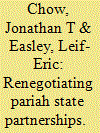| Srl | Item |
| 1 |
ID:
032963


|
|
|
|
|
| Publication |
London, Croom Helm, 1980.
|
| Description |
281p.
|
| Standard Number |
0709902034
|
|
|
|
|
|
|
|
|
|
|
|
Copies: C:1/I:0,R:0,Q:0
Circulation
| Accession# | Call# | Current Location | Status | Policy | Location |
| 018951 | 320.951/BRY 018951 | Main | On Shelf | General | |
|
|
|
|
| 2 |
ID:
144756


|
|
|
|
|
| Summary/Abstract |
Israel’s China policy has traditionally been influenced by Washington’s explicit and perceived pressure. In the early 2010s, Israel started to explore a more independent path in regard to China. In view of global developments, such a change seemed reasonable. However, prevailing conditions prevent Israel from developing an independent China policy.
|
|
|
|
|
|
|
|
|
|
|
|
|
|
|
|
| 3 |
ID:
168441


|
|
|
|
|
| Summary/Abstract |
Pariah status for violating international norms over decades increased Myanmar and North Korea’s dependence on China. Myanmar’s post-2010 reforms sought to reduce international sanctions and diversify diplomatic relations. North Korea pursued a diplomatic offensive after the 2018 Winter Olympics, but only after declaring itself a nuclear state. Why, despite both states’ politically unsustainable dependence on China, did Myanmar and North Korea pursue different strategies for renegotiating reliance? Unlike the Kim regime, Myanmar’s junta could step back from power while protecting its interests. Pro-democracy leader Aung San Suu Kyi was a credible signaler of reforms, providing Western governments political cover to reduce sanctions. Myanmar used liberalizing reforms to address internal threats, whereas North Korea utilizes external threats for regime legitimacy. The theoretical underpinnings and empirical trajectories of these distinctions–as well as Myanmar’s backsliding on human rights–explain why reducing reliance on China may prove more difficult than shedding pariah status.
|
|
|
|
|
|
|
|
|
|
|
|
|
|
|
|